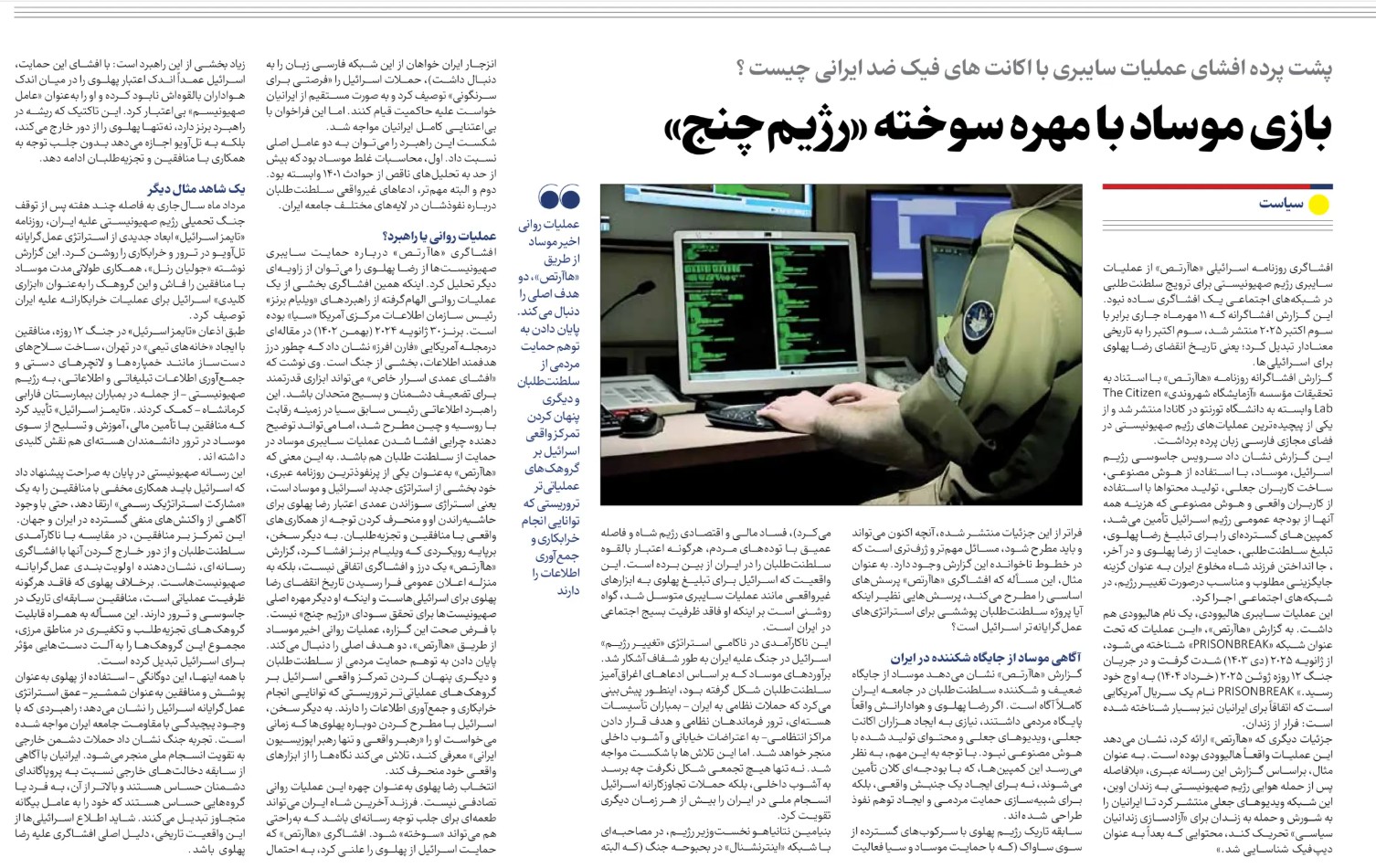Avash News: According to Iran newspaper, this revealing report, released on Oct. 10, 2025, turned October 3rd into a meaningful date: the expiration date of Reza Pahlavi for the Israelis.
The explosive report by Haaretz was based on research conducted by The Citizen Lab, affiliated with the University of Toronto in Canada, and exposed one of the most complicated operations by the Zionist regime of Israel on Persian-speaking social media platforms.
The report showed that Israel’s espionage service, Mossad, conducted a massive campaign to promote Reza Pahlavi and monarchism, gain support for Reza Pahlavi, and ultimately embed the son of the deposed Shah of Iran as a desirable and legitimate option for regime change on social media platforms. This was achieved through artificial intelligence, creating fake users, producing content using real users, with funding provided through the public budget of the Israeli regime.
This Hollywood-style cyber operation also had a Hollywood-style name. According to Haaretz, “the operation—known under the name Prisonbreak—intensified since January 2025 and reached its peak during the 12-day war.” Prisonbreak is the name of an American series popular among many Iranians.
The details show that the operation was truly Hollywoodian. For example, according to the Hebrew newspaper, “immediately after the airstrike by the Israeli regime on Evin Prison, the channel started publicizing fake videos to trigger Iranians to rise and attack Evin Prison to free ‘political prisoners,’ a content that was later identified as fake.”
Beyond these details, what emerges now are much more important and deeper issues hidden between the lines of the report. For instance, the revelation by Haaretz raises a number of fundamental questions, such as: is the project of monarchism a cover-up for Israel’s practical strategies?

Mossad’s awareness of fragile position of monarchism
Haaretz’s report shows that Mossad is well aware of the weak and fragile position of monarchism in Iranian society. If Reza Pahlavi and his supporters held a real grassroots position, they would not need fake videos and accounts produced by AI. Given this important issue, it seems these campaigns, funded with huge budgets, were designed to simulate grassroots support and create the illusion of influence rather than to create a real movement.
The dark history of the Pahlavi regime, with massive suppression by SAVAK (which allegedly operated with the help of Mossad and SIA), financial and economic corruption of the Shah’s regime, and his deep distance from the masses, has destroyed any potential credibility of monarchism in Iran. The reality that Israel, in publicizing Pahlavi, has resorted to unreal instruments such as cyber operations, obviously attests to his lack of capability for social mobilization in Iran.
His inefficiency became clear in the strategic failure of the “regime change” campaign during the war against Iran. Mossad’s estimation, formed according to exaggerated claims by monarchists, predicted that a military attack on Iran—bombing nuclear facilities, massacring military commanders, and targeting police stations—would lead to street protests and domestic unrest. However, these attempts failed. No protest gatherings formed, let alone domestic chaos. In contrast, aggression by Israel boosted national cohesion and unity among Iranians more than at any other time.
Benjamin Netanyahu, the Prime Minister of the Israeli regime, in an interview with Iran International TV Channel amidst the war (which was followed by Iranians’ hatred), described Israel’s attack “as an opportunity to overthrow” and directly asked Iranians to rise against the government. However, his call faced Iranians’ indifference.
The failure of this strategy can be attributed to two factors: first, wrong calculations by Mossad that relied too much on incomplete analysis of the 1401 events in Iran; second, and more importantly, the unrealistic claims by the monarchists about their influence on different strata of Iran’s society.
A psychological or strategic operation?
The revelation by Haaretz about the Zionists’ cyber operation and its support from Reza Pahlavi can also be analyzed from another dimension. The revelation itself was part of a psychological operation inspired by William Burns’ strategies. Burns, the head of the Intelligence Service of the United States (SIA), wrote in an article in Foreign Policy on Jan. 30, 2024, about how purposeful leaks of information are part of war. He stated that “purposeful revelation of specific secrets” can be a strong leverage to weaken enemies and mobilize allies. This strategy, which was primarily raised in the context of competition with Russia and China, can also explain the reason for the revelation of Mossad’s cyber operation in support of monarchism. It means that Haaretz, one of the most influential Hebrew newspapers, is itself part of a new strategy by Israel and Mossad—meaning the purposeful burning of Reza Pahlavi’s credibility in order to marginalize him and divert attention from their real cooperation with hypocrites (Monafeqin) and separatists.
In other words, according to the approach William Burns exposed, Haaretz’s report was not an accidental revelation or leak but a public announcement of the expiry date of Reza Pahlavi for the Israelis and that he is no longer a main factor for them to realize their dream of “regime change.”
If this is true, the recent psychological operation by Mossad through Haaretz seeks two goals: to put an end to the illusion of grassroots support for monarchism and to hide the real focus of Israel on more operative terrorist groups that are able to commit sabotage and collect information. In other words, Israel, by highlighting Pahlavi again—who was once promoted as “the real and only leader of Iran’s opposition”—tries to divert attention from its real instruments.
The selection of Reza Pahlavi as the face of a psychological operation is not accidental. The last child of the Shah of Iran can be easy prey for attracting media attention and can easily be burned. The revelations by Haaretz that publicized Israel’s support for Pahlavi are very likely part of this strategy: by revealing this support, Israel purposely destroyed the slight credibility of Pahlavi among his few potential supporters and devalued him as a “Zionist agent.” This tactic, which has roots in Burns’ strategy, not only eliminates Pahlavi but also allows Tel Aviv to continue its cooperation with hypocrites (Monafeqin) and separatists.
* *The views expressed in this article belong to the author and do not necessarily reflect the editorial policy of Avash News.







